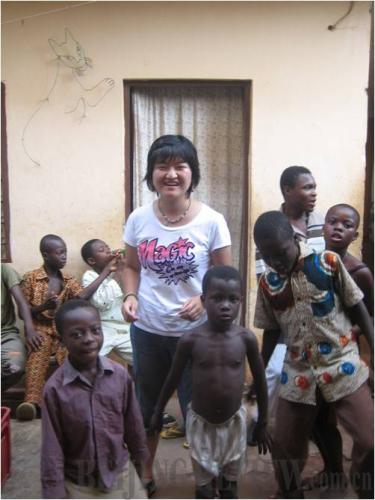|
It is a demographic of approximately 240 million people born between 1980 and 1990. Dubbed China's "New Generation," its members are often considered selfish, cold and rebellious. And as dramatic changes sweep across China's economy and society, their voices are being heard louder and clearer than ever before on the world stage. They are the China's Generation Y, the country's first one-child generation.
 |
|
VOLUNTEER: Liu Jing from Dongbei University of Finance and Economics helps educate young Togo children (COURTESY OF LIU JING) |
Born into a transitional societal period when Deng Xiaoping's 1980s reform and opening-up policies were coming into effect, these children grew up in a time of market economy development in the 1990s. Since China's entry into the WTO at the beginning of the 21st century, they have become increasingly dominant players in society.
Fast food, Hollywood blockbusters and the Internet make up a major part of their lives. They are connected, their fingers are on the world's pulse, but they have been branded spoiled and accused of lacking a sense of social responsibility.
Since 2008, these labels have begun to be discarded somewhat. That year saw a spotlight shine on the group not only because of the Olympic Games held in Beijing, but because of its collective effort to help in the aftermath of the May 12 Wenchuan earthquake in Sichuan Province. Tens of thousands volunteered to boost earthquake relief efforts following the disaster.
"Compared to the obedience of their elders, this generation seeks more independence. It explains why many of them were steadfastly volunteering in the disaster-hit areas then," says Gong Fangbin, a professor at the National Defense University of the Chinese People's Liberation Army. The disaster offered young people a chance to display their patriotism and social responsibility, he added.
Even though life has now returned back to normal, the post-80s generation still deals with constant competition – to get into a good university, to get a good job, to find a decent apartment. However, they are versatile. A new generation of migrant workers has swarmed into the urban job market in search of not only work and someone with whom to build a family, but also self-advancement. Many post-80s graduates are not only trying to find decent-paying jobs, but would like to work at the grassroots level (for example, in the less developed areas of west China). Others look to move to Africa for a chance to expand their horizons.
|